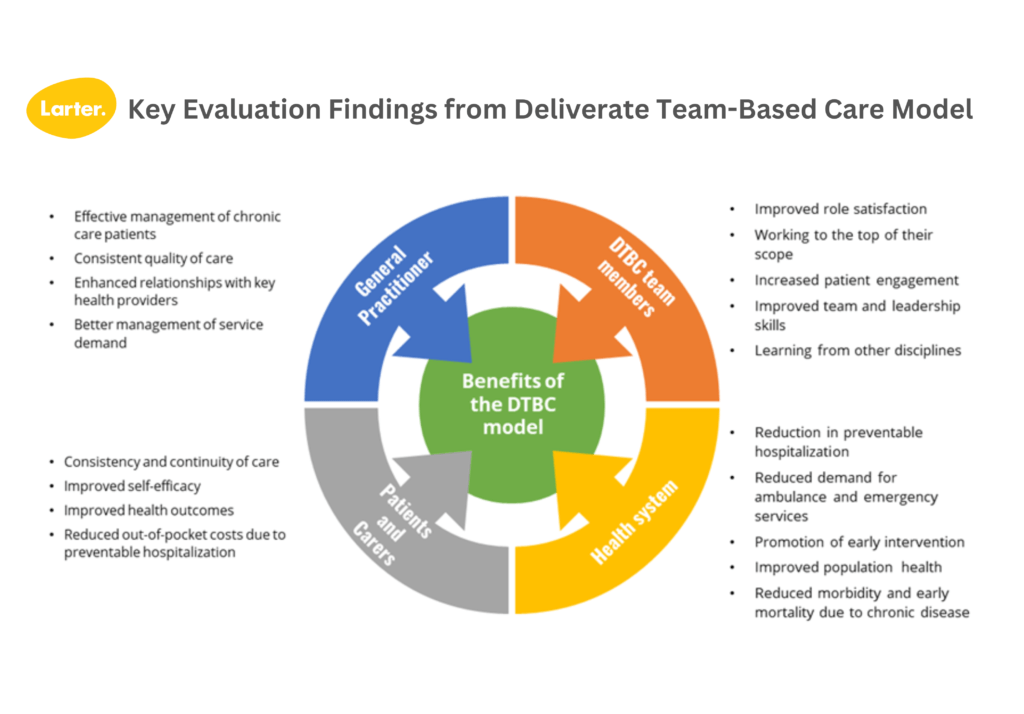The challenge
Deliberate Team-Based Care in Canola Fields is a multidisciplinary, community-based, integrated care model that was developed and began operating in 2018 in Canowindra, a small rural town in western New South Wales by a local GP, who leads the Nyrang Health Team. The goal is to improve the health and wellbeing of patients with chronic conditions, and at high risk of health decline in Canowindra; as well as to enhance the ability of the health workforce to better respond to patient need.
The aim of the model is to support patient-centred care planning that is shared amongst the team and encourages response to acute and chronic clinical needs by all members of the multidisciplinary team (which includes allied health – physiotherapist, occupational therapist, pharmacists, and paramedics among others), in a structured approach. The model’s key activities are:
- Risk stratification and enrolment
- Health Assessment
- Patient-centred care plan development by the multidisciplinary team in a case conference
- Patient review
The Rural Doctors Network (RDN) on behalf of the Collaborative Care Program (CCP) partners in Western NSW – Western NSW Local Health District (WNSWLHD), Western NSW Primary Health Network (WNSWPHN) was interested in evaluating the Canola Fields project (Deliberate Team-Based Care, DTBC) model to understand:
-
- The model’s impact on patient experience and clinical outcomes
- Clinician experiences of providing care within the model
- The sustainability of the model
- Learnings for implementing a similar model in other rural NSW communities for the benefit of community members.
Our approach
In response, Larter Consulting undertook a strengths-based evaluation using a process outcomes approach to identify the program’s achievements and learnings, by collecting data in 2023 from the lead general practice, multidisciplinary health care team, as well as through a survey and opt-in interviews with a sample of Canola Fields patients.
Larter built on the research protocol developed by RDN approved by Greater Western Human Research Ethics Committee in the first phase of the evaluation and incorporated a realist evaluation framework.
Topics explored with stakeholders included program implementation and outcomes of the program for clients, the multidisciplinary health team members, and the broader health system in Canowindra and surrounds. The program’s successes, enablers, and barriers to program implementation were also investigated and analysed.
These lines of enquiry were developed by Larter through a workshop with CCP partners. Larter used descriptive statistics to identify year-on-year trends since 2018, and Medicare billing data for DTBC patients was analysed to determine the sustainability of the model.
A case study approach was used to highlight specific instances where clients were supported in receiving care in place, and hospitalisation was avoided for them.

The outcome
Larter consolidated insights from this evaluation in a detailed evaluation report for the CCP partners which was submitted to the Commonwealth by RDN. The deliverables met the expectations of RDN and the Commonwealth, with the case studies and sustainability analysis rated as being particularly valuable. The evaluation recommendations were accepted by CCP partners, as well as the GP leading the Canola Fields project, who continues to deliver the program in Canowindra.
Larter evaluators are skilled in delivering participatory evaluations in rural Australia and generating powerful insights into what success looks like from their unique perspectives, as well as synthesising these insights for programs to guide investment decisions for funders. Larter consultants are specialists in the design of data collection tools as well as data analysis to generate actionable insights. These insights can help commissioners understand how existing programs or services can be enhanced to bring positive change.
Contact us to explore how Larter can help your organisation and community through meaningful evaluation.
